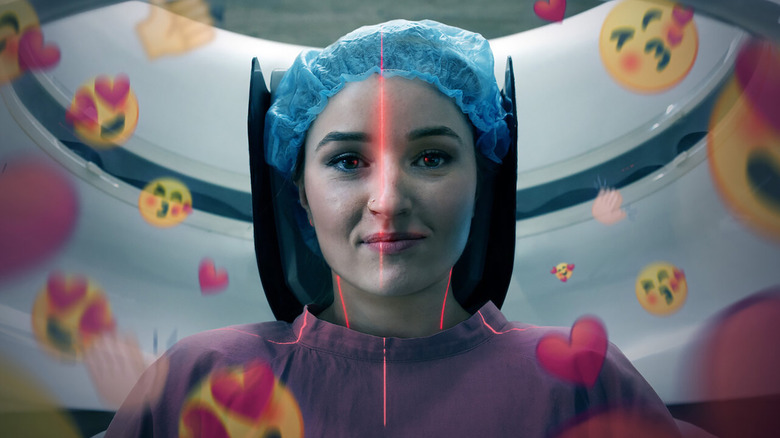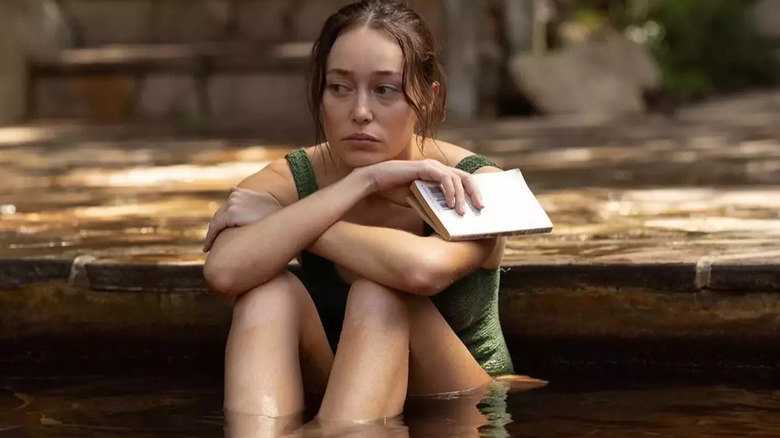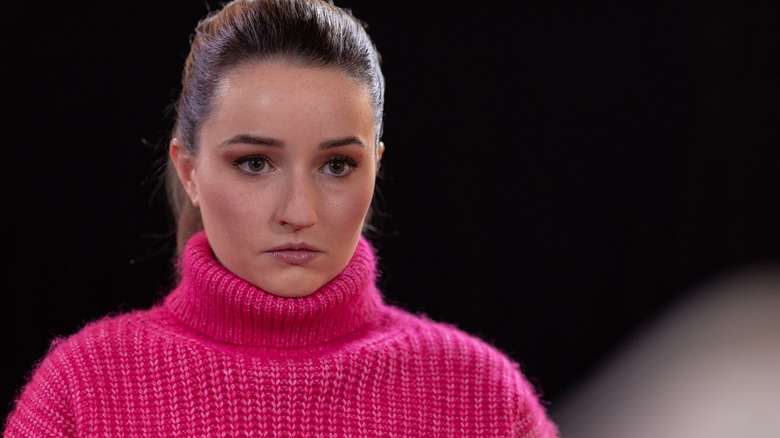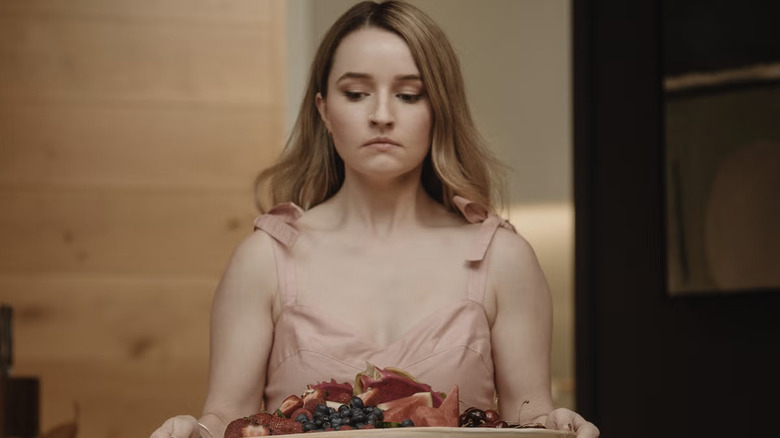The Subject Of Netflix's Apple Cider Vinegar Hurt Real People, I Could Have Been One Of Them
We may receive a commission on purchases made from links.
When a doctor sits you down and says, "You have cancer," there's no way of predicting how your body and mind will respond. Getting the answer to an unthinkable question instantly opens the floodgates to hundreds of new questions you'd never think you'd have to ask yourself. There are obvious, big questions like "How am I going to tell my grandma that I might not outlive her?" But there are also smaller questions like, "What is my last meal going to be before cancer treatment screws up my tastebuds?" Few moments in life are more isolating, confusing, and threatening than hearing a doctor drop The Big C, no matter how strong your support system is. My parents were in the room with me when I got the confirmation. My dad — a Joe Pesci-looking, working-class, Chicago-Italian tough guy — fell out of his chair. Cancer brings even the most macho people to their knees.
Last year, I wrote about my pancreatic cancer journey through the lens of watching "Inside Out" and "Inside Out 2," and in doing so I mentioned how my loved ones weren't ... super great about processing the fact I was sick. When people love you, they often impulsively have this desire to try and fix your problems. But when you have cancer, there's nothing anyone can do to "fix" it, which leaves them feeling helpless and attempting to do anything to bring you a sense of peace. For my dad, it was spontaneously buying me random, overpriced items from the hospital gift shop that he thought would bring me happiness (and that is why I still own a Hello Kitty plushie styled after Peter Criss from KISS and a trinket box of The Wicked Witch of the West atop a cloud of red smoke). And this extended beyond my family. I was sent so many stuffed animals, gift cards, candles, and at-home "self-care" products that I ran out of room to keep them.
I was also sent a copy of "The Whole Pantry," the recipe book from Belle Gibson — the cancer grifter on which the new Netflix series "Apple Cider Vinegar" is based.
The true crime industrial complex has expanded
Netflix loves producing limited series based on true stories, but the ethics behind each show vary. In the case of "Baby Reindeer," the series loosely based on a real-life stalking incident endured by comedian Richard Gadd was made with him at the center, allowing him to take control of his story (despite Netflix viewers' inability to respect his boundaries) on his own terms. On the other end of the spectrum is something like "Monsters: The Lyle and Erik Menendez Story" or "Dahmer — Monster: The Jeffrey Dahmer Story" where the families of the real-life people depicted in the series have spoken out against the Netflix shows' retraumatizing existence. But in the last few years, a hyperspecific trend in true crime dramatizations has emerged: the white woman scammer.
Netflix's "Inventing Anna" tackled the wealth scammer Anna Delvey (real name Anna Sorokin), Hulu's "The Dropout" dissected Theranos founder Elizabeth Holmes, and ABC recently took the popular "Scamanda" podcast and gave it the docuseries treatment focusing on another cancer grifter, Amanda Riley. It makes sense why people become fixated on these sorts of stories; they provide the rush of psychological fascination found in true crime, but the people at the center typically don't carry the ethical baggage that gossiping or theorizing about a serial killer might. There's also the thrill of believing that had you been in the same circumstances, you would have "seen the red flags" and avoided being scammed like others had. It's a way to cathartically convince yourself that no matter how scared or insecure you might feel at any given moment, you can revel in the schadenfreude that "at least you didn't fall for Anna Delvey's scam."
But the thing people tend to forget is that when it comes to scammers in the landscape of healthcare or the wellness industry, there are very real victims left in their wake. Belle Gibson might have been at the center of "Apple Cider Vinegar," but the story also focuses on a woman named Milla Blake, a fictionalized character who the creators claim is an amalgamation of three different wellness entrepreneurs, including "The Wellness Warrior" Jessica Ainscough (who tragically passed from epithelioid sarcoma when alternative cancer methods failed). While Blake's character was not scammed by Gibson, she was absolutely led astray by the pseudoscience freely hawked online, and perpetuated the same cycle to tragic results.
America's obsession with white woman grifters
Belle Gibson, Anna Delvey, Elizabeth Holmes, and Amanda Riley all have a few things in common; they're conventionally attractive, they're incredibly convincing storytellers, and they're white women. These are women who have figured out the way society perceives and underestimates the specific intersection of identity that they all inhabit, and found a way to exploit it for personal gain. Considering the true crime entertainment audience is also predominately made up of white women, there's no surprise that they'd flock to these stories like catnip.
But there's an inherent difference in the way stories like "Apple Cider Vinegar" are viewed in the cultural zeitgeist compared to male scammers. These are women meant to be mocked, ridiculed, gossiped about, and sent death threats for their crimes, whereas Jordan Belfort gets his life story adapted in Martin Scorsese's "The Wolf of Wall Street" and Frank Abagnale, Jr. gets the Steven Spielberg-directed "Catch Me if You Can," with both men played by Leonardo DiCaprio to heavy praise.
And yes, of course, we could make the argument that the stories are "different" because rigging the stock market or lying about being a pilot isn't nearly the moral failing that peddling junk science to cancer patients is (while lying about actually having cancer), but there's no denying that stories of white male scammers and grifters become the subject of Oscar bait films, while stories of white women scammers become binge-worthy television socially categorized in the same camp of "junk food" viewing as reality TV. As far as scammers and grifters that aren't white, well, we already know that in America there is no redemption afforded to those who aren't white. I also highly recommend Laci Mosley's book "Scam Goddess: Lessons from a Life of Cons, Grifts, and Schemes" or her TV show on Freeform for more information.
Closing the door on The Whole Pantry
As "Apple Cider Vinegar" shows, there were scared, vulnerable people who believed in Belle Gibson's wellness grift and ended their pursuit of traditional medicine in the hopes that something more homeopathic and natural would be the cure to end their sickness and suffering. There is no way to know just how many people were impacted by Gibson's lies because there are countless stories like mine. When I was given "The Whole Pantry," it was just before Gibson was outed by journalists Beau Donelly and Nick Toscano in 2015 as a scammer.
It was gifted to me by a well-meaning loved one who was desperate to help me in any possible way, hoping that perhaps if I made some of these recipes and completely changed my diet, my body would react in a way that would help me survive. I had a 4% chance of living longer than 5 years, so to say the people in my life were desperate for a miracle is putting it lightly. I don't bemoan the person who gifted me Gibson's book since their intentions were pure (and, to be quite honest, the recipes in the book are legitimately tasty). But that's what makes grifters and scammers so insidious; they're actively taking advantage of people at the end of their rope. I don't blame sick people for pursuing alternative treatments, either. Cancer is hell, the U.S. healthcare system is a joke, and when you have someone promising you a miracle when what you need is a miracle ... well, logical thinking just can't cut it.
I'd be lying if I didn't admit that when I was at my absolute lowest and most hopeless — when I was being mocked in public for having visible drainage tubes hanging out of my body as I tried to do something nice for myself to distract from the excruciating pain burning in my abdomen — I contemplated foregoing traditional treatments and focusing on alternative methods. I didn't see any hope for my survival and the statistics were already up against me anyway, so what harm was there in trying something kinder on my body if I was going to die regardless? I'm grateful I stayed on course because it's been 11 years since my diagnosis and I'm still here.
"Apple Cider Vinegar" is more than just an addictive limited series or the latest water cooler discussion topic led by Netflix, and should be discussed with as much severity as its subject matter. It's a way for countless people, myself included, to welcome the rest of the world by giving grifters like Belle Gibson a giant middle finger because she, like all of the other scammers mentioned in this article, deserves it.



